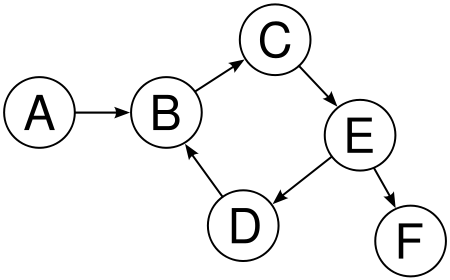The web as a directed graph: Difference between revisions
Mr. MacKenty (talk | contribs) |
Mr. MacKenty (talk | contribs) |
||
| Line 16: | Line 16: | ||
<br /> | <br /> | ||
And another example of a directed graph | And another example of a directed graph | ||
<br /> | |||
[[File:Web directed graph.png|500px]] | [[File:Web directed graph.png|500px]] | ||
Revision as of 13:58, 19 January 2018

A graph[edit]
In mathematics, and more specifically in graph theory, a graph is a structure amounting to a set of objects in which some pairs of the objects are in some sense "related". The objects correspond to mathematical abstractions called vertices (also called nodes or points) and each of the related pairs of vertices is called an edge (also called an arc or line). Typically, a graph is depicted in diagrammatic form as a set of dots for the vertices, joined by lines or curves for the edges.[2]
A directed graph[edit]
In mathematics, and more specifically in graph theory, a directed graph (or digraph) is a graph that is a set of vertices connected by edges, where the edges have a direction associated with them.[3]
The web as directed graph[edit]
Each of the nodes represents a web site. Each edge represents a link either coming TO a website or leaving FROM a website.

In the case of our example above, node A links to node B. Node D also links to node B.
And another example of a directed graph

Do you understand this?[edit]
Standards[edit]
These standards are used from the IB Computer Science Subject Guide[4]
- Describe how the web can be represented as a directed graph
References[edit]
- ↑ http://www.flaticon.com/
- ↑ https://en.wikipedia.org/wiki/Graph_(discrete_mathematics)
- ↑ https://en.wikipedia.org/wiki/Directed_graph#Basic_terminology
- ↑ IB Diploma Programme Computer science guide (first examinations 2014). Cardiff, Wales, United Kingdom: International Baccalaureate Organization. January 2012.